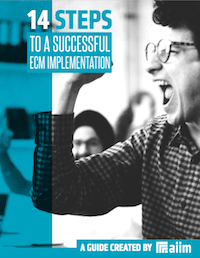The AIIM Blog
Keep your finger on the pulse of Intelligent Information Management with industry news, trends, and best practices.
Document Management | Enterprise Content Management (ECM)
Capturing and storing digital assets for your organization with an ECM or DM solution is only the first step. Now you need to leverage those digital assets to drive revenue and cut costs further. So here is your checklist for making technology choices to complement and future-proof your ECM or DM implementation.
Share
Outsourcing is an unparalleled strategy that enables businesses to focus on their core business needs and better serve their customers. It’s also an effective way to build a culture capable of adapting to change at a moment’s notice. Today, many companies are reviewing their operations in-depth to understand their true core competencies and determine what processes to outsource to become more efficient.
Share

Making an ECM implementation successful requires planning and attention to detail. The best way to create the right solution is to identify organizational goals and priorities. Learn how to manage a successful implementation in our free guide.
Capture and Imaging | Document Management | Electronic Records Management (ERM)
In this day and age, we are faced with more and more electronic receipts, contracts, bills, etc as the paper ones continue to be phased out. However, what about that garage full of old documents you’ve been collecting for the past twenty years?
Share
Automation | Document Management
As standard documents become more complex, and organizations adopt new systems and technology, the information for these documents needs to come from different places. Pricing information may come from a financial management, sales configuration, or Enterprise Resource Planning (ERP) system, while customer contact details may be stored in a customer relationship management (CRM) or contract management system. Other parts of these documents may only need to be included in certain situations, or spreadsheets that contain charts that need to somehow be incorporated. This process is often time consuming, unwieldy and error-prone. Organizations can gain extra efficiencies and optimize their resources by automating the creation of standard documents. Automation can also extend traditional templates to become more powerful by taking advantage of new technologies and other data sources.
Share
Business Process Management (BPM) | Document Management
When most people think of e-forms, they think of a fillable PDF that is printed, signed, and either scanned for emailing, faxed, or – heaven forbid – mailed. Whichever scenario you conjure up, a fillable PDF is not a “true” electronic form and cannot provide companies with an integrated solution to streamlining and automating key business processes. Here are eight ways in which “true” electronic forms can transform your business. This is especially important, since according to Gartner, 85% of business processes rely on forms.
Share
Digital Signatures | Document Management | Paperless Office
The law is on your side. Digital signatures are as legally binding as a physical, hand-written signature in every circumstance where a signature is required. The E-SIGN law and the Uniform Electronic Transactions Act are supported by the federal government and have been adopted by 47 states. It clearly states “(c) If a law requires a record to be in writing, an electronic record satisfies the law” with the purpose “to facilitate and promote commerce and governmental transactions by validating and authorizing the use of electronic records and electronic signatures." Further refinements by the EU, PIPEDA and the FDA recommend making sure the signature is unique to the signer, and that the signer’s identity is linked to the document. When combined with good governance and unalterable file formats, you can easily meet the guidelines for legality.
Share